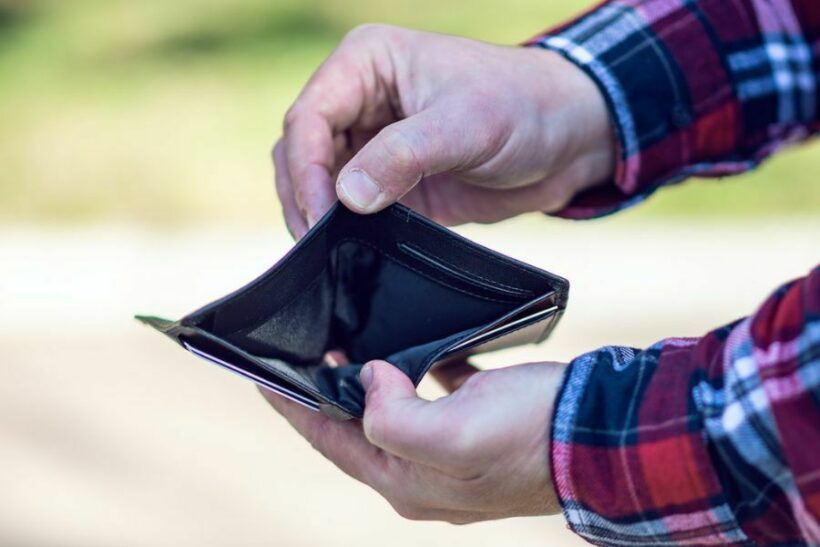Business
Thailand’s 14.9 Trillion Baht Household Debt is a Ticking Time Bomb

Household debt has become an alarming issue in Thailand, and as the country prepares for a general election this year, it is a ticking time bomb that requires the immediate attention of political parties making policy promises to voters.
In the third quarter of last year, household debt had risen to 14.9 trillion baht, equal to 87 percent of GDP (GDP). “The Bank for International Settlements (BIS) warns that a household debt-to-GDP ratio of 80 percent is cause for concern as an international benchmark,” Suwannee Jatsadasak, assistant governor of the Bank of Thailand told ThaiPBS.
Significant Increase in Household Debt
Thailand’s household debt has risen dramatically in the last decade, rising from 59.3 percent of GDP in 2010 to 86.9 percent in the third quarter of last year.
She claims that two-thirds of the debt is related to consumption and only one-third is related to housing loans, a pattern that contrasts with that of advanced economies such as Japan and Hong Kong.
Slower economic growth and the aftermath of COVID-19 are cited as possible explanations for the persistently high household debt.
Opposition parties have long blamed low economic growth on Gen.Prayut Chan-o-cha, who took power following the 2014 military coup.
Pheu Thai’s audacious plans
In the run-up to the general election, the main opposition Pheu Thai Party is campaigning on economic policies that, if elected, will increase annual economic growth to 5%. The party is promising policies that will help low-income people in order to close the wealth gap.
The party has also promised to raise the daily minimum wage to 600 baht and to set a monthly starting salary of 25,000 baht for office workers with a bachelor’s degree.
To alleviate the plight of low-income farmers, the party promises to use artificial intelligence (AI) technology to increase farm productivity. The party says it will use non-fungible tokens (NFTs), a type of digital asset, to promote Thai farm products for farm marketing. The party’s policy will prioritize raising the incomes of young adults and farmers.
Facts about household debt that are concerning According to Suwannee, a BOT study discovered eight key facts about Thailand’s household debt.
Debtors begin borrowing money when they are very young. According to the study, 58 percent of the working population aged 25 to 29 years begin to accumulate significant debt. One-quarter of the total become non-performing loans. Credit card, personal loan, car hire-purchase, and motorcycles are among their debts. Some of them use their vehicles to make a living, while others add to their mounting bad debt. The study found that the debt of people under the age of 25, including high school and college students, who borrow money, has been increasing.
Debtors borrow amounts that are greater than their ability to repay and from multiple lenders. It is estimated that 30% of credit card and personal loans have four creditors on average. On average, the debt is 10-25 times the monthly individual income. It is significantly higher than the international benchmark practice of limiting debt to 5-12 times monthly income.
According to the report, in Thailand, monthly debt payments account for more than half of the borrower’s monthly income, and credit card and personal loans account for more than half of the individual’s total debt.
Credit cards and personal loans, which have high interest rates, are at the heart of the debt problem. These loans lack collateral and are typically short-term debt, resulting in a large monthly installment payment.
Because of the high interest rate, many people are unable to repay their debt, and approximately 60% of these accounts default on their debt obligations.
The loan snare
Debtors do not have sufficient or accurate information about loans. Financial institutions are to blame for failing to clearly explain loan conditions such as fees, loan default fees, and so on. Some debtors are enticed by low interest rates but end up with a long-term loan, trapping them in a debt cycle.
Because 62 percent of Thai families do not have adequate savings for emergency spending, many are forced to borrow money. More than half of Thai households would be unable to repay debts if their own income fell by 20%, forcing them to borrow from financial institutions or loan sharks to make ends meet. Because of their reliance on uncertain income streams, the majority of them are unable to service debt. According to the study, such groups include farmers, freelancers, self-employed people, street vendors, people who do odd jobs, people who provide services, and factory workers.
Being trapped in a debt cycle
Many debtors have been trapped in a debt cycle for a long time. According to the BOT study, about a quarter of people over the age of 60 still have debts to repay, averaging 415,000 baht per person. The majority of them are farmers or have credit card debt. Others who took out low-interest personal loans have a longer repayment period, such as three percent interest and seven years.
Personal loans and farm loans account for the majority of bad debts. Approximately 10 million loan accounts have become delinquent. During the pandemic, 4.5 million accounts defaulted, representing 3.1 million people, with a total debt of 400 billion baht.
Defaulting accounts in state-owned Specialized Financial Institutions (SFIs) account for 70%, non-banks 20%, and commercial banks 10%. Personal loans and farm loans account for the vast majority of bad debts.
Reliance on loan sharks
There is no visible end to the debt cycle, and roughly one-third of debtors who were sued by creditors still owe money after foreclosure. The proceeds from the forced sale of their assets are insufficient to cover the debt. One issue is that debtors cannot access debt restructuring with creditors before and after filing a lawsuit and receiving a court verdict.
Retail debtors who do not own a business are not eligible for bankruptcy protection. This prevents them from accessing the rehabilitation process, resulting in perpetual debt. According to the central bank, the bankruptcy law may need to be changed to accommodate these individuals.
Debt owed to underground lenders continues to pose problems for the system. Around 42 percent of the 4,600 families who sought assistance through a debt resolution scheme launched by the central bank and the Finance Ministry owed an average of 54,300 baht to underground lenders.
Why are loan sharks preferred?
They must borrow from sources other than banks, non-banks, or SFIs for three reasons: They are unable to access the financial system due to their uncertain income stream; financial institutions do not have information about their income record, so they do not lend; or they may lend but at high interest rates; borrowing from loan sharks is convenient despite the high interest rates because they do not require loan collateral. To repay their debts to financial institutions, some debtors borrow from underground lenders.
What comes next?
The BOT intends to issue new regulations requiring responsible financial lending. The BOT has also proposed changes to bankruptcy law. However, the amendment must be approved by Parliament.
The central bank’s study challenges political parties to find solutions to the dire household debt situation.


































